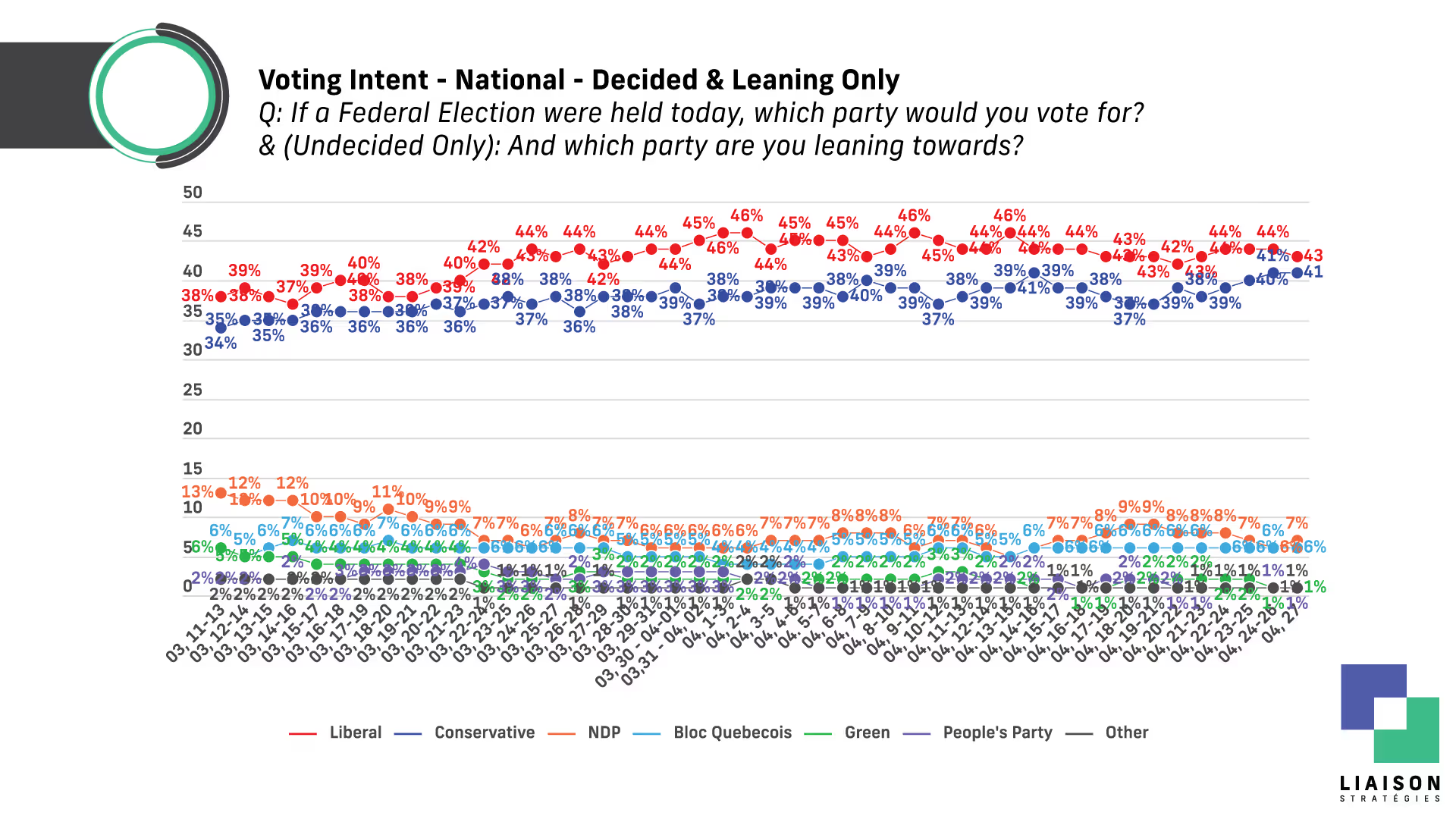(Toronto, ON) – The final poll by Liaison Strategies for the National Ethnic Press and Media Council of Canada (NEPMCC), the industry association representing Canada’s non-official language newspapers, TV, radio, and online news media for the 45th Canadian election, finds the Liberals leading with 43% (-1) to the Conservatives 41% (no change).
The survey, conducted on April 27, 2025, used interactive voice response technology to poll 1,000 Canadian voters. The results have a margin of error of +/- 3.09%, 19 times out of 20.
Liaison Strategies, a member of the Canadian Research Insights Council (CRIC), was the most accurate polling firm in the 2025 Ontario Provincial Election.
David Valentin, Principal at Liaison Strategies, said the following:
Welcome to the end of the daily tracker for the 45th Canadian Election. Well - it's been a run! Full of challenges anticipated and unanticipated (mostly unanticipated).
For our final survey we are publishing a one-day, 1000 person sample from today.

Today’s survey shows the Liberals at 43% nationally, holding a slim lead over the Conservatives at 41%. The NDP sits at 7%, with the Bloc Québécois at 6%, and the smaller parties (Greens, PPC, and Others) remaining marginal at 1% each.
Regionally, the Liberals continue to perform well. They hold a commanding lead in Atlantic Canada with 57%, lead in Quebec at 44% (with the Bloc at 25%), and post a strong 48% in Ontario compared to the Conservatives' 43% - though the lead in Ontario has softened in the last few days. In British Columbia, the race is tighter, with the Conservatives at 43% and the Liberals close behind at 42%. As expected, the Conservatives dominate the Prairies and Alberta, posting 52% and 65% respectively.
The NDP shows some signs of life, reaching 12% in British Columbia - their best regional performance - but they remain stagnant nationally. The Bloc holds steady at 25% in Quebec, continuing to underperform compared to previous cycles.
Given the survey’s margin of error, it’s possible—if everything breaks just right—that the result could be a Liberal minority, but a Liberal majority remains the more likely outcome.
Some thoughts before I go...
Carleton - We've been told by insiders this is a close race and the counting of the advance polls will start 6 hours early. OK, but what about the votes cast on election day? Polls in Ontario close at 9:30 PM, and even assuming the count begins quickly, say by 9:45 PM, there’s still a major complication: thanks to the longest ballot committee, Carleton has 91 candidates on the ballot. If turnout is high and the race is tight, it’s entirely possible that Carleton won’t be called until after Mr. Poilievre has already addressed the general election results. We saw from the by elections that these extra long ballots take a very long time to count.
Saskatoon - We were the first polling firm to survey the city, mainly to test how the NDP vote was collapsing. Our thinking was that if the decline wasn’t neat and uniform, traditional modeling wouldn’t easily detect movement in places like Saskatoon. Our hypothesis was proven right when we looked at our polling results that showed a tight race in the city between the Liberals and Conservatives. Since then, more polling firms have polled Saskatoon and found similar competitive results. Mr. Poilievre visited in the last week, and Mr. Carney has made two campaign stops in the city (including one today) - so will the Liberals pick up any seats or will they just be close races?
The polls will look very wrong at the beginning of the night - a friendly reminder that early in the night the polls are going to look very wrong. Until the western ridings start reporting, the numbers will be skewed. The Conservative vote is heavily concentrated in the west, and we’ll need those results to come in before we get a clearer picture of the national popular vote.
Good luck to all tomorrow!
À propos de Stratégies Liaison
provincial et fédéral et est apparu dans les médias canadiens pour discuter de ses observations.
Liaison est membre du Conseil de recherche et d’intelligence marketing canadien, le porte-parole canadien des professionnels de la recherche, de l’analyse et de l’information, tant au Canada qu’à l’étranger.

